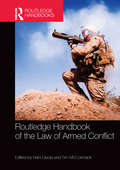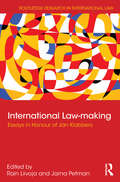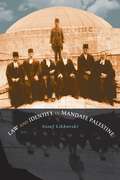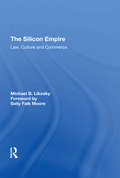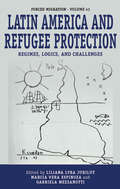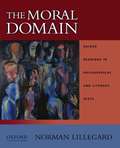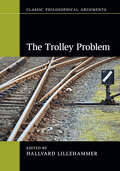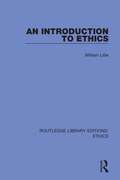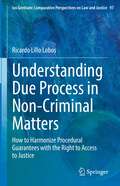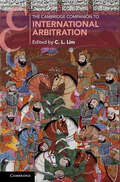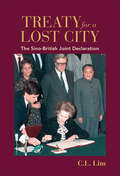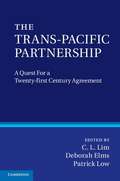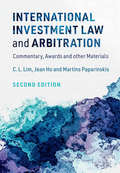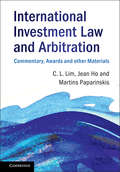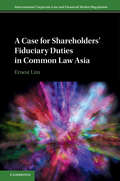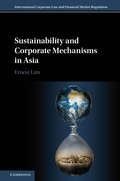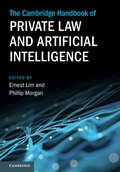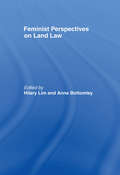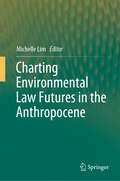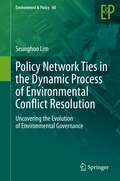- Table View
- List View
Routledge Handbook of the Law of Armed Conflict
by Rain Liivoja Tim McCormackThe law of armed conflict is a key element of the global legal order yet it finds itself in a state of flux created by the changing nature of warfare and the influences of other branches of international law. The Routledge Handbook of the Law of Armed Conflict provides a unique perspective on the field covering all the key aspects of the law as well as identifying developing and often contentious areas of interest. The handbook will feature original pieces by international experts in the field, including academics, staff of relevant NGOs and (former) members of the armed forces. Made up of six parts in order to offer a comprehensive overview of the field, the structure of the handbook is as follows: Part I: Fundamentals Part II: Principle of distinction Part III: Means and methods of warfare Part IV: Special protection regimes Part V: Compliance and enforcement Part VI: Some contemporary issues Throughout the book, attention is paid to non-international conflicts as well as international conflicts with acknowledgement of the differences. The contributors also consider the relationship between the law of armed conflict and human rights law, looking at how the various rules and principles of human rights law interact with specific rules and principles of international humanitarian law in particular circumstances. The Routledge Handbook of the Law of Armed Conflict provides a fresh take on the contemporary laws of war and is written for advanced level students, academics, researchers, NGOs and policy-makers with an interest in the field.
International Law-making: Essays in Honour of Jan Klabbers (Routledge Research in International Law)
by Rain Liivoja Jarna PetmanThis book explores law-making in international affairs and is compiled to celebrate the 50th birthday of Professor Jan Klabbers, a leading international law and international relations scholar who has made significant contributions to the understanding of the sources of international legal obligations and the idea of constitutionalism in international law. Inspired by Professor Klabbers’ wide-ranging interests in international law and his interdisciplinary approach, the book examines law-making through a variety of perspectives and seeks to breaks new ground in exploring what it means to think and write about law and its creation. While examining the substance of international law, these contributors raise more general concerns, such as the relationship between law-making and the application of law, the role and conflict between various institutions, and the characteristics of the formal sources of international law. The book will be of great interest to students and academics of legal theory, international relations, and international law.
Law and Identity in Mandate Palestine
by Assaf LikhovskiOne of the major questions facing the world today is the role of law in shaping identity and in balancing tradition with modernity. In an arid corner of the Mediterranean region in the first decades of the twentieth century, Mandate Palestine was confronting these very issues. Assaf Likhovski examines the legal history of Palestine, showing how law and identity interacted in a complex colonial society in which British rulers and Jewish and Arab subjects lived together. Law in Mandate Palestine was not merely an instrument of power or a method of solving individual disputes, says Likhovski. It was also a way of answering the question, "Who are we?" British officials, Jewish lawyers, and Arab scholars all turned to the law in their search for their identities, and all used it to create and disseminate a hybrid culture in which Western and non-Western norms existed simultaneously. Uncovering a rich arsenal of legal distinctions, notions, and doctrines used by lawyers to mediate between different identities, Likhovski provides a comprehensive account of the relationship between law and identity. His analysis suggests a new approach to both the legal history of Mandate Palestine and colonial societies in general.
Human Rights Struggles in Twentieth-century France: The League of the Rights of Man and Causes Célèbres (Palgrave Studies in the History of Social Movements)
by Max LikinThis book provides an introduction to human rights controversies in twentieth-century France, from the Dreyfus Affair at the beginning of the century, to the arguments over women and immigrants’ rights at its end. Using the Ligue des Droits de L’Homme (LDH) - or the League of the Rights of Man - as a narrative thread for this chronological study, the book tracks the gradual expansion of human rights in France in the wake of the two world wars, the Algerian quagmire and decolonisation more generally. Examining the capital role of the LDH whilst also highlighting the role of individuals and key activists, the book helps us to contextualise the quandaries faced by unseen minorities, particularly colonial subjects and women. The analysis also demonstrates the influence of French human rights activism on key international documents of human rights law, such as the Universal Declaration of Human Rights. The LDH occupies a central place in French justice debates and is therefore an ideal template to analyse the rising influence of humanitarianism and crimes against humanity in French causes célèbres from the 1970s onwards. However, the author goes further to look beyond the LDH and even France itself, offering wide-ranging surveys of dominant rights issues across Europe at any given period. Drawing on extensive research and interviews with key members of the LDH, this book provides an accessible overview of human rights struggles in twentieth-century France.
The Silicon Empire: Law, Culture and Commerce (Law, Justice, And Power Ser.)
by Michael B. LikoskyMichael Likosky examines the continuities and discontinuities between colonial and present-day high tech transnational legal orders. His concern is specifically with the colonial characteristics of the legal order which underpins the global high tech economy. He distinguishes the democratic and human rights rhetoric of this economy from a reality wherein the legal order is often used to reproduce colonial-type relationships. Just as in the colonial period, the expansion of trans-border commerce overlaps with democratic demands and human rights in complex, multifaceted and paradoxical ways. Through a case study looking at Malaysia's Multimedia Super Corridor, a high tech national development plan and foreign direct investment scheme, he examines how the transnational leaders of the high tech economy along with the Malaysian political elite react when human rights problems threaten to derail commercial plans.
Latin America and Refugee Protection: Regimes, Logics and Challenges (Forced Migration #41)
by Liliana Lyra Jubilut, Marcia Vera Espinoza and Gabriela MezzanottiLooking at refugee protection in Latin America, this landmark edited collection assesses what the region has achieved in recent years. It analyses Latin America’s main documents in refugee protection, evaluates the particular aspects of different regimes, and reviews their emergence, development and effect, to develop understanding of refugee protection in the region. Drawing from multidisciplinary texts from both leading academics and practitioners, this comprehensive, innovative and highly topical book adopts an analytical framework to understand and improve Latin America’s protection of refugees.
Latin America and Refugee Protection: Regimes, Logics, and Challenges (Forced Migration #41)
by Liliana Lyra Jubilut, Marcia Vera Espinoza and Gabriela MezzanottiLooking at refugee protection in Latin America, this landmark edited collection assesses what the region has achieved in recent years. It analyses Latin America’s main documents in refugee protection, evaluates the particular aspects of different regimes, and reviews their emergence, development and effect, to develop understanding of refugee protection in the region. Drawing from multidisciplinary texts from both leading academics and practitioners, this comprehensive, innovative and highly topical book adopts an analytical framework to understand and improve Latin America’s protection of refugees.
The Moral Domain: Guided Readings in Philosophical and Literary Texts
by Norman Lillegard<p>This engaging, interactive and pedagogical introduction to ethics combines the best features of a textbook and an anthology. The Moral Domain: Guided Readings in Philosophical and Literary Texts contains numerous readings from key philosophical writings in ethics along with captivating literary selections that bring the ethical issues to life. Offering extensive excerpts from major figures in the history of Western ethics--Aquinas, Aristotle, Hobbes, Hume, Kant, Mill and Plato--the book also integrates work from non-Western perspectives, including selections from the Bhagavad Gita, Confucian views and Hsun-Tzu. It also represents women's voices with readings by Julia Annas, Sarah Broadie, Carol Gilligan, Martha Nussbaum and others. Literary selections--including work from the Bible, Camus, Dostoevsky, Golding, Sophocles, Tolstoy, Twain and Wharton--enable students to grasp deep ethical concepts at an intuitive level. <p>The Moral Domain features a unique built-in study guide that helps students to better comprehend and interact with the material. It introduces each selection with orienting questions and then intersperses explanations, commentary and study questions (designed to test comprehension and provoke reflection) throughout the readings. Each chapter includes a "Further Discussion and Applications" section that demonstrates how ethical theory affects such contemporary moral debates and problems as abortion, euthanasia, feminism, hunger, warfare and more. An exemplary text for introduction to ethics and moral philosophy courses, The Moral Domain provides a comprehensive and accessible introduction to all facets of ethics; its foundations, history, debates and current real-life controversies.</p>
The Trolley Problem (Classic Philosophical Arguments)
by Hallvard LillehammerThe Trolley Problem is one of the most intensively discussed and controversial puzzles in contemporary moral philosophy. Over the last half-century, it has also become something of a cultural phenomenon, having been the subject of scientific experiments, online polls, television programs, computer games, and several popular books. This volume offers newly written chapters on a range of topics including the formulation of the Trolley Problem and its standard variations; the evaluation of different forms of moral theory; the neuroscience and social psychology of moral behavior; and the application of thought experiments to moral dilemmas in real life. The chapters are written by leading experts on moral theory, applied philosophy, neuroscience, and social psychology, and include several authors who have set the terms of the ongoing debates. The volume will be valuable for students and scholars working on any aspect of the Trolley Problem and its intellectual significance.
An Introduction to Ethics
by William LillieOriginally published in 1948, and reprinted in 1955 and updated in 1961, this book is a straightforward account of moral philosophy for students. It discusses comprehensively the contributions made by 20th Century moralists, both in terms of the interpretation of their predecessors and original ethical speculation.
Understanding Due Process in Non-Criminal Matters: How to Harmonize Procedural Guarantees with the Right to Access to Justice (Ius Gentium: Comparative Perspectives on Law and Justice #97)
by Ricardo Lillo LobosHow we understand what procedure is due as a fundamental or constitutional right can have a critical impact on designing a civil procedure. Drawing on comparative law and empirically oriented methodologies, in this book the author provides a thorough analysis of how procedural due process is understood both in national jurisdictions and in the field of international human rights law.The book offers a suitable due process theory for civil matters in general, assessing the different roles that this basic international human right plays in comparison with criminal justice. In this regard, it argues that the civil justice conception of due process has grown under the shadow of criminal justice for too long. Moreover, the theory answers the question of what the basic requirements are concerning the right to a fair trial on civil matters, i.e., the question of what we can and cannot sacrifice when designing a civil procedure that correctly distributes the risk of moral harm while remaining accessible to people with complex and simple legal needs, in order to reconcile the requirements of procedural fairness with social demands for justice.This book makes a valuable contribution to the field of civil justice, legal design, and access to justice by providing an empirically based normative theory regarding the right to a fair trial. As such, it will be of interest to a broad audience: policymakers, practitioners and judges, but also researchers and scholars interested in theoretical questions in jurisprudence, and those familiar with empirical legal studies, comparative law, and other socio-legal studies.
WTO Domestic Regulation and Services Trade
by Aik Hoe Lim Bart De MeesterDomestic regulation of services sectors has a significant impact on services trade liberalization, which is why General Agreement on Trade in Services (GATS) disciplines are negotiated in the WTO. With the help of analyses and case-studies from academics, regulators and trade experts, this book explores the scope and limits of WTO legal principles to promote domestic regulatory reform. Case-studies discuss country-specific challenges and experiences of regulating important service sectors, such as finance, telecommunications, distribution, legal, education, health, postal and logistics services, as well as the role of regulatory impact assessments. The findings will interest trade officials, policy-makers, regulators, think tanks and businesses concerned with the implications of domestic regulation on access to services markets, and with the opportunities for formulating trade disciplines in this area. It is also a useful resource for academics and students researching regulatory approaches and practices in services sectors.
Alternative Visions of the International Law on Foreign Investment
by C. L. LimThis book is about the forces that are reshaping the international law on foreign investment today. It begins by explaining the liberal origins of contemporary investment treaties before addressing a current backlash against these treaties and the device of investment arbitration. The book describes a long-standing legal-intellectual resistance to a neo-liberal global economic agenda, and how tribunals have interpreted various treaty standards instead. It introduces our reader to the changes now taking place in the design of a range of familiar treaty clauses, and it describes how some of these changes are now driven not only by developing and emerging economies but also by the capital-exporting nations. Finally, it explores the life, career and writings of Muthucumaraswamy Sornarajah, a scholar whose work has been dedicated to the realisation of many of these changes, and his views about the hold global capital has over legal practice.
The Cambridge Companion to International Arbitration (Cambridge Companions to Law)
by C. L. LimThis Cambridge Companion explores the main senses of the term 'international arbitration'; including the arbitration of private commercial disputes, disputes between a State and a foreign investor, disputes between States and also between a State and its parts. It treats these various forms as being inter-related, if not always conceptually, then as a matter of history, rather than as collective victims of imprecise language. The book touches not only on current debates but also more foundational aspects, such as the tension between party autonomy and State authority, and the pacifist roots of modern international arbitration. Thus, it aims to offer a concise survey of the history, the main issues as well as the latest developments in a single, handy volume. It will be an invaluable introduction to the subject for students studying international arbitration, commercial law and international law, and also lawyers and the general reader.
Treaty for a Lost City: The Sino-British Joint Declaration
by C. L. LimThe Sino-British Joint Declaration was signed in 1984 and transferred control of Hong Kong to the People's Republic of China from the 1st July 1997. This sets the scene for the establishment of the Special Administrative Region (SAR) in Hong Kong, which has been at the heart of the civil unrest in 2019-2020, culminating in the National Security Law on 30 June 2020. In the 25th anniversary year of the handover of Hong Kong, C. L. Lim uses British archival sources to re-examine the Joint Declaration, the negotiations that led up to it, and its resounding significance that continues to the present day. Beginning with Margaret Thatcher's preparations for her Beijing trip, the book takes a chronological approach and offers a valuable, single-volume history of the Joint Declaration. In light of tumultuous current events in Hong Kong, Lim provides a vital, clear explanation of the legal complexities that have underpinned the relationships between China, Hong Kong and Britain since 1979.
The Trans-Pacific Partnership
by C. L. Lim Deborah K. Elms Patrick LowThe Trans-Pacific Partnership (TPP) talks attempt to link together at least nine countries in three continents to create a 'high-quality, twenty-first century agreement'. Such an agreement is intended to open markets to competition between the partners more than ever before in sectors ranging from goods and services to investment, and includes rigorous rules in the fields of intellectual property, labour protection and environmental conservation. The TPP also aims to improve regulatory coherence, enhance production supply chains and help boost small and medium-sized enterprises. It could transform relations with regions such as Latin America, paving the way to an eventual Free Trade Area of the Asia Pacific, or see innovations translated into the global trade regulatory system operating under the WTO. However, given the tensions between strategic and economic concerns, the final deal could still collapse into something closer to a standard, 'twentieth-century' trade agreement.
International Investment Law and Arbitration: Commentary, Awards and other Materials
by C. L. Lim Jean Ho Martins PaparinskisInternational investment law and arbitration is a rapidly evolving field, and can be difficult for students to acquire a firm understanding of, given the considerable number of published awards and legal writings. The first edition of this text, cited by courts in Singapore and Colombia, overcame this challenge by interweaving extracts from these arbitral decisions, treaties and scholarly works with concise, up-to-date and reliable commentary. Now fully updated and with a new chapter on arbitrators, the second edition retains this practical structure along with the carefully curated end-of-chapter questions and readings. The authors consider the new chapter an essential revision to the text, and a discussion which is indispensable to understanding the present calls for reform of investment arbitration. The coverage of the book has also been expanded, with the inclusion of over sixty new awards and judicial decisions, comprising both recent and well-established jurisprudence. This textbook will appeal to graduates studying international investment law and international arbitration, as well as being of interest to practitioners in this area.
International Economic Law after the Global Crisis
by C. L. Lim Bryan MercurioThis collection explores the theme of fragmentation within international economic law as the world emerges from the 2008 global financial crisis, the subsequent recession and the European sovereign debt crisis which began in early 2010. The post-crisis 'moment' itself forms a contemporary backdrop to the book's focus on fragmentation as it traces the evolution of the international economic system from the original Bretton Woods design in the aftermath of the Second World War to the present time. The volume covers issues concerning monetary cooperation, trade and finance, trade and its linkages, international investment law, intellectual property protection and climate change. By connecting a broad, cross-disciplinary survey of international economic law with contemporary debate over international norm and authority fragmentation, the book demonstrates that this has been essentially a fragmented and multi-focal system of international economic regulation.
International Investment Law and Arbitration: Commentary, Awards And Other Materials
by Chin Leng Lim Jean Ho Martins PaparinskisWhat was once a contested body of principles applied peripherally to the international settlement of expropriation disputes has been transformed and in its place now stands an important area of international disputes practice. International Investment Law and Arbitration offers a comprehensive introduction to the subject. <P><P>Presenting the facts of daily legal practice and the largely unaltered aims of the subject alongside a broad selection of key awards and original materials, historical developments are discussed in the context of the changing directions in the arbitral jurisprudence and current treaty and arbitration reform debate.<P> Key features: accessible and engaging commentary integrated throughout, end of chapter questions test reader understanding, further reading lists support and encourage exploration of the subject. Suitable for postgraduate law students studying modules on international investment arbitration, International Investment Law and Arbitration offers an indispensable introduction to the subject.<P> Accessible commentary accompanies key awards and materials.<P> Historical developments are discussed in the context of the changing directions in the arbitral jurisprudence and current treaty and arbitration reform debate.<P> Every chapter has questions to test reader understanding as well as a list of further reading to encourage exploration of the subject.
A Case for Shareholders' Fiduciary Duties in Common Law Asia (International Corporate Law and Financial Market Regulation)
by Ernest LimThis book reconceptualises the role of the general meeting and shareholders in the listed companies in four leading common law jurisdictions in Asia (Singapore, Hong Kong, India and Malaysia) as one that should include fiduciary duties. It demonstrates why, when, by whom and how fiduciary duties should be imposed and how they could be enforced. In so doing, it refutes the long-standing common law rule that shareholders can generally vote as they please. The book advances the debate on a central notion of corporate law, namely, the interests of the company. It addresses the deficiencies in the law regulating conflicts of interest involving controlling shareholders and institutional shareholders and provides solutions to the problem of activist and passive minority institutional investors. This book challenges us to rethink the meaning and implementation of the long-term success of the company and shows how corporate governance should and could be made.
Sustainability and Corporate Mechanisms in Asia (International Corporate Law and Financial Market Regulation)
by Ernest LimThis is the first book to provide a comparative and critical analysis of why and how six corporate mechanisms - (1) sustainability reporting; (2) board gender diversity; (3) constituency directors; (4) stewardship codes; (5) directors' duty to act in the company's best interests; and (6) liability on companies, shareholders and directors - have been or can be used to promote sustainability in the four leading common law jurisdictions in Asia (Singapore, Hong Kong, India and Malaysia). A central challenge is, whether and if so, how the corporate mechanisms should be reconceptualised to promote sustainability in an environment that is characterised by controlling shareholders, particularly the government in state-owned enterprises. Because controlling shareholders are the norm for the majority of the world's companies, and state-owned enterprises play a significant role, this book has important insights on the problems and prospects of advancing sustainability in concentrated and mixed ownership jurisdictions.
The Cambridge Handbook of Private Law and Artificial Intelligence (Cambridge Law Handbooks)
by Ernest Lim Phillip MorganAI appears to disrupt key private law doctrines, and threatens to undermine some of the principal rights protected by private law. The social changes prompted by AI may also generate significant new challenges for private law. It is thus likely that AI will lead to new developments in private law. This Cambridge Handbook is the first dedicated treatment of the interface between AI and private law, and the challenges that AI poses for private law. This Handbook brings together a global team of private law experts and computer scientists to deal with this problem, and to examine the interface between private law and AI, which includes issues such as whether existing private law can address the challenges of AI and whether and how private law needs to be reformed to reduce the risks of AI while retaining its benefits.
Feminist Perspectives on Land Law (Feminist Perspectives)
by Hilary Lim Anne BottomleyThe first book to examine the critical area of land law from a feminist perspective, it provides an original and critical analysis of the gendered intersection between law and land; ranging land use and ownership in England and Wales to Botswana, Papua New Guinea and the Muslim world. The authors draw upon the diverse disciplinary fields of law, anthropology and geography to open up perspectives that go beyond the usually narrow topography and cartography of land law. Addressing an unorthodox variety of sites where questions of women's access and rights to land are raised, this book includes chapters on: shopping malls ancient monuments nature reserves housing estates the family home. An interdisciplinary and enlivening account of feminist perspectives on land law, it is an excellent addition to the bookshelves of students and researchers in legal studies, gender studies, social anthropology and social geography.
Charting Environmental Law Futures in the Anthropocene
by Michelle LimThis book explores a range of plausible futures for environmental law in the new era of the Earth’s history: the Anthropocene. The book discusses multiple contemporary and future challenges facing the planet and humanity. It examines the relationship between environmental law and the Anthropocene at governance scales from the global to the local. The breadth of issues and jurisdictions covered by the book, its forward-looking nature, and the unique generational perspective of the contributing authors means that this publication appeals to a wide audience from specialist academics and policy-makers to a broader lay readership.
Policy Network Ties in the Dynamic Process of Environmental Conflict Resolution: Uncovering the Evolution of Environmental Governance (Environment & Policy #60)
by Seunghoo LimExtensive previous research has investigated environmental conflict management issues in networked settings and the design of policy networks, but the emergence and evolution of self-organizing policy networks are still not fully understood. Especially misunderstood is the problem of how the multiple motivations or incentives of competing policy actors in conflictual situations affect their structures of interaction, as this issue has not been studied systematically. This book aims to address the following research questions: how do policy stakeholders cope strategically with collective action or environmental conflict resolution? How do they utilize or maintain formal and informal policy networks to resolve problems effectively? What motivates them to engage or be involved in collaborative or conflictual networks? What influences their networking or their decisions on partner selection for conflict resolution? This book consists of four studies. The goal of the first study is to examine the form of a policy network by focusing on how policy networks emerge and evolve at the micro-level to solve collective action dilemmas endemic to decentralized and democratized policy decision-making processes, particularly in the environmental conflict resolution arena. The goal of the second study is to examine the main policy actors and structural characteristics of network governance evolution in the dynamic process of environmental conflict resolution. The goal of the third study is to highlight the role of policy tie formality in the evolution of multiplex ties in the environmental conflict resolution process. The goal of the fourth study is to demonstrate the relationships between patterns of interactions among policy actors and their modified and adjusted strategic behaviours within policy networks and across advocacy coalitions.
